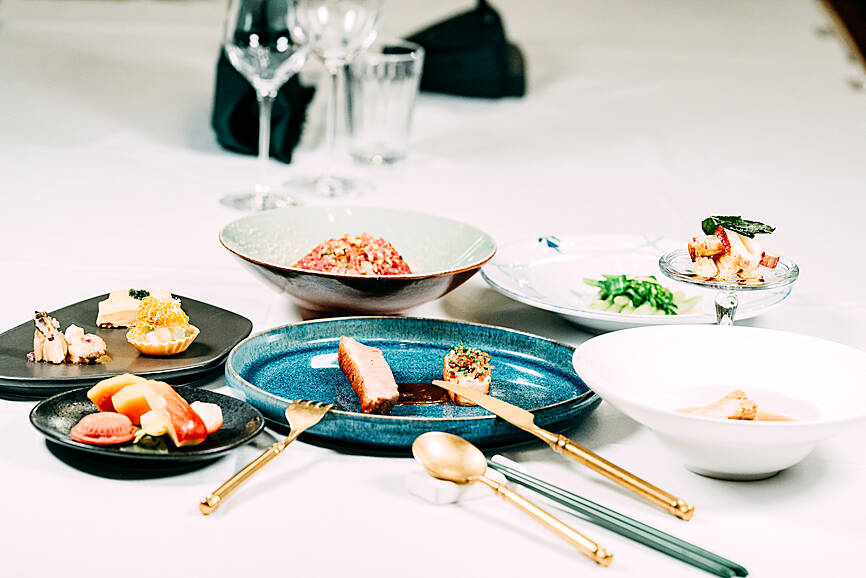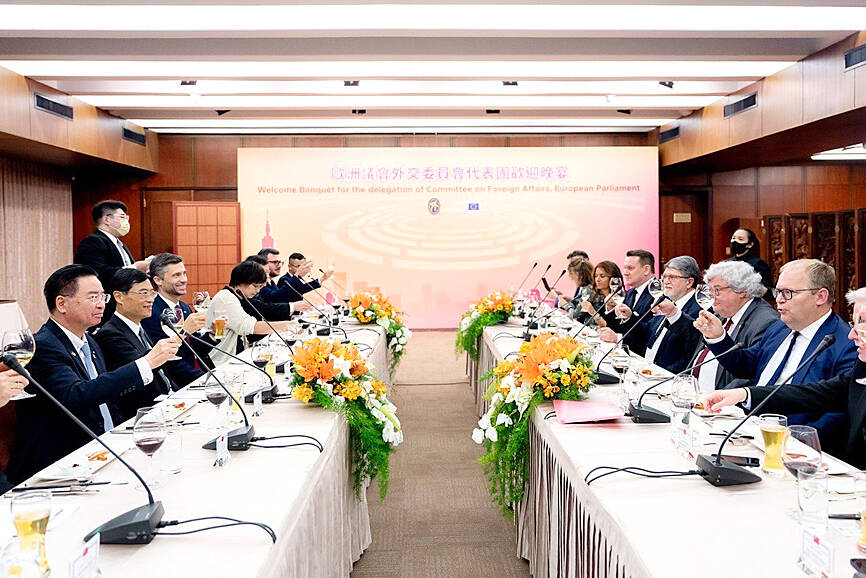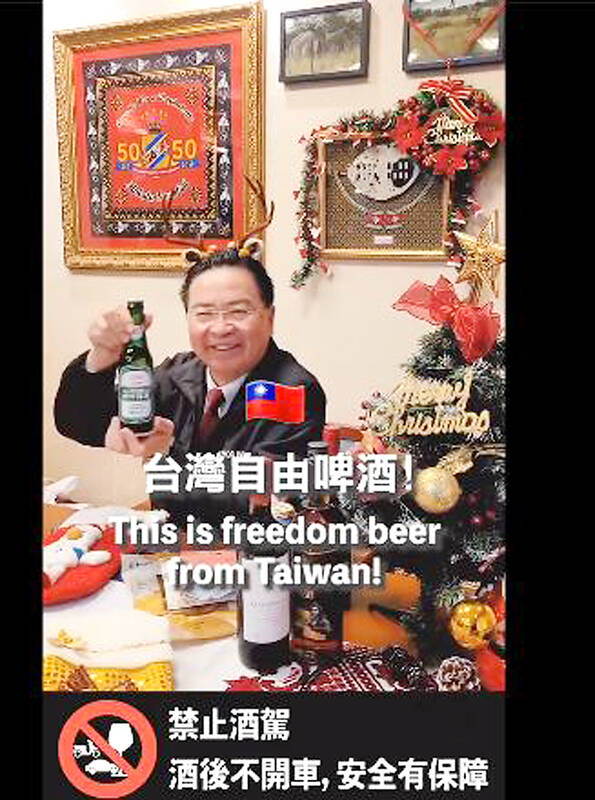As the nation’s international visibility continues to rise and the situation in the Taiwan Strait gains more global attention, larger delegations of the nation’s higher-level foreign friends choose to show their support by visiting in-person. It is the Ministry of Foreign Affairs Department of Protocol’s job to ensure the guests enjoy their time in Taiwan, especially at the dinner table.
Organizing diplomatic feasts is no small feat, department officials said, adding that from designing the menus to communicating with catering service providers and attending to the diners at the banquets, everything can go wrong, yet nothing can really go wrong.
It requires attention to detail, spontaneity and ingenuity, the ministry added.

Photo courtesy of the Ministry of Foreign Affairs
Preparation is key, and as the saying goes — the devil is in the details, it said, adding that almost every decision is made to facilitate conversation, which is the top priority for such occasions.
The preparation starts with knowing your enemy --- no --- your guests. Dietary restrictions due to allergies or religions must be strictly followed. These not only affect what they can eat, but sometimes when they can eat.
For example, during Ramadan, banquets for Muslim guests can only be arranged after sunset and dates should be prepared for them to break the fast with, as it is tradition and easy on the digestive system.

Photo courtesy of the Ministry of Foreign Affairs
After the taboos are identified and avoided, there are still countless choices to be made, including the location, the menu, the seating and even the shape of the tables.
The majority of the banquets are held at the ministry, the Taipei Guest House or hotels, depending on factors such as the ranks and the itineraries of the hosts and the guests, the department said.
Only the president, vice president, premier, minister of foreign affairs and the Presidential Office secretary-general can host banquets at the Taipei Guest House, as stipulated by law, and usually only for foreign ministers or those of a higher rank.

Photo: Screen grab from the ministry’s X account
During the COVID-19 pandemic, long tables, instead of round tables were used for easier installation of partitions, the department said. The practice continues post-pandemic as guests found it easier to engage in conversation while sitting at long tables, the department said.
The big day could be daunting as surprises are almost a guarantee, it said. The guests might arrive late, which would affect the timing when dishes have to be prepared and served. A no-show does not mean one fewer person to worry about, as there cannot be an empty seat at the table.
SURPRISE CHANGES
A guest who claims to be a vegetarian might ask for the steak that their neighbors seem to be enjoying so much, while another suddenly decides to refrain from a particular ingredient and another would like a second serving. They should all be satisfied without being put on the spot, and the head of the delegation and the host should definitely not be disturbed or alarmed, it said.
Taiwan is known for its abundant produce and great food so the menu must not disappoint. So what is on the menu?
The menu is designed with the image of Taiwan and the palate of the guests in mind. Banquets are good opportunities to show off Taiwanese ingredients and introduce foreign guests to traditional Taiwanese cuisine.
However, people from landlocked countries might be unfamiliar with most seafood, and beef that is not cooked well-done might startle others, the department said.
A quick question: What do these ingredients have in common — pineapple, sugar apple, wax apple, mango and grouper?
The answer: All of them are or have been banned by China. The unreasonable import bans caused these products to be regulars on the menu as they are not only delicious, but also great conversation starters, the department said.
Ingredients imported from the guests’ countries are sometimes incorporated in the dishes as a gesture of support and a symbol of friendship, it said.
All the dishes have to be easy to eat, so rice is preferable to noodles; bones, skins and shells are almost always removed before the plate is sent out, it said.
The names of dishes might be creative and flowery in Mandarin, but they should be easily understood in English to reassure the diners, it said, adding that the dishes served should require little explanation. For instance, dipping fried dough sticks (油條) in the accompanied almond tea (杏仁茶) might not be straightforward to most of the guests, and might be a dish that is best avoided.
Guests celebrating their birthdays during the trip to Taiwan would receive a surprise birthday cake at the banquet, and those who reveal their love for a particular Taiwanese dish might have their wishes fulfilled too — the true spirit of Taiwanese hospitality.
Taiwan’s famous xiaolongbao (小籠包), or juicy soup dumplings, was added to the banquet menu at the last minute after a member of the US delegation that visited the nation earlier this year expressed regret at not being able to try it due to their busy schedule, the department shared.
As guests do not usually provide feedback on the food, satisfied smiles and clean plates speak louder than words, it said.
The department also revealed that Minister of Foreign Affairs Joseph Wu (吳釗燮) is not picky about food and enjoys promoting Taiwan’s “freedom beer” at the banquets.

POSITIVE DEVELOPMENT: Japan and the US are expected to hold in-depth discussions on Taiwan-related issues during the meeting next month, Japanese sources said The holding of a Japan-US leaders’ meeting ahead of US President Donald Trump’s visit to China is positive news for Taiwan, former Japan-Taiwan Exchange Association representative Hiroyasu Izumi said yesterday. After the Liberal Democratic Party’s landslide victory in Japan’s House of Representatives election, Japanese Prime Minister Sanae Takaichi is scheduled to visit the US next month, where she is to meet with Trump ahead of the US president’s planned visit to China from March 31 to April 2 for a meeting with Chinese President Xi Jinping (習近平). Japan and the US are expected to hold in-depth discussions on Taiwan-related issues during the

‘LIKE-MINDED PARTNER’: Tako van Popta said it would be inappropriate to delay signing the deal with Taiwan because of China, adding he would promote the issue Canadian senators have stressed Taiwan’s importance for international trade and expressed enthusiasm for ensuring the Taiwan-Canada trade cooperation framework agreement is implemented this year. Representative to Canada Harry Tseng (曾厚仁) in an interview with the Central News Agency (CNA) said he was increasingly uneasy about Ottawa’s delays in signing the agreement, especially as Ottawa has warmed toward Beijing. There are “no negotiations left. Not only [is it] initialed, we have three versions of the text ready: English, French and Mandarin,” Tseng said. “That tells you how close we are to the final signature.” Tseng said that he hoped Canadian Prime Minister Mark Carney

President William Lai (賴清德) yesterday bestowed one of Taiwan’s highest honors on Saint Vincent and the Grenadines (SVG) Ambassador Andrea Clare Bowman in recognition of her contributions to bilateral ties. “By conferring the Order of Brilliant Star with Grand Cordon on Ambassador Bowman today, I want to sincerely thank her, on behalf of the Taiwanese people, for her outstanding contribution to deepening diplomatic ties between Taiwan and SVG,” Lai said at a ceremony held at the Presidential Office in Taipei. He noted that Bowman became SVG’s first ambassador to Taiwan in 2019 and

A man walks past elementary school artworks at the Taipei Lantern Festival in Ximen District yesterday, the first day of the event. The festival is to run from 5pm to 10pm through March 15.